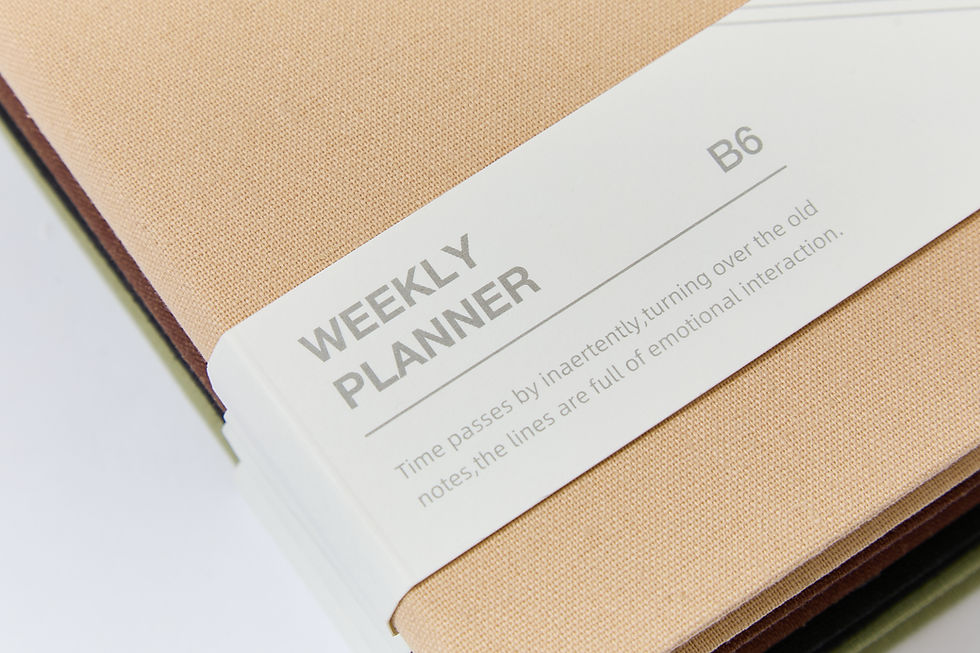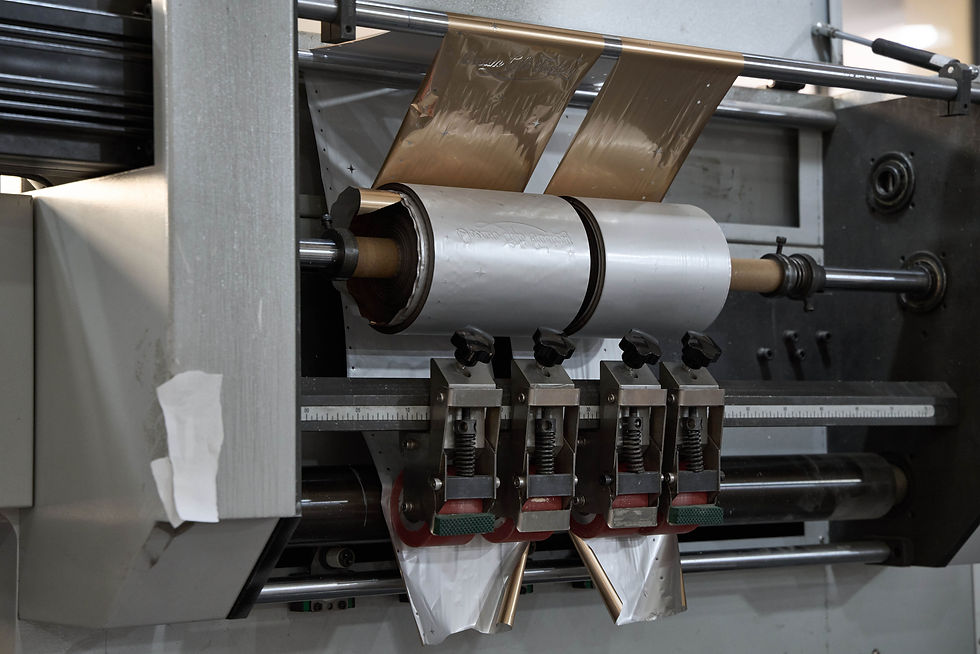Fabric Cloth Cover Printed Custom Notebooks: Everything You Need to Know
- Leo Xia

- Oct 15, 2025
- 9 min read
Updated: Oct 15, 2025
A Fabric Cloth Cover Printed Custom Notebook uses a durable cloth or linen cover that is printed or decorated with custom graphics. Cloth covers add timeless elegance and tactile appeal; their robustness protects pages and gives a premium feel. These notebooks can be customized with various binding methods, finishes and add‑ons to reflect your brand’s style and function.
Quick Content Reach:
Introduction to Fabric Cloth Cover Printed Custom Notebooks
A fabric cloth cover printed custom notebook pairs traditional craftsmanship with modern printing. Instead of paper or PU covers, the cover is made from cloth or linen, giving it a textured, luxurious finish. Cloth covers appeal to publishers and consumers because they combine elegance with durability. Linen creates a more textured look suited for upscale editions, while smooth cloth provides versatility for everyday notebooks. The tactile sensation of cloth encourages users to engage with the notebook, elevating the writing and journaling experience.

These notebooks are particularly popular for premium corporate gifts, journals, planners and art books. For B2B buyers, fabric covers signify quality and exclusivity. They also protect the contents, ensuring the notebook remains pristine even with frequent handling . With careful design and finishing touches, such notebooks become cherished items that users keep long after the pages are filled.
If you’re looking to enhance your stationery line with fabric‑covered notebooks, contact Lion Paper Products. Our experts will walk you through fabric choices, printing techniques and pricing to create unique notebooks that reflect your brand’s identity.
Popular Cloth Bound Projects
Cloth Bound Notebook and Journal
Cloth covers are ideal for notebooks and journals because they provide a perfect balance of style, function and durability. A cloth bound notebook offers a satisfying tactile experience for note‑taking, sketching or journaling and appeals to professionals, students and creatives. The versatility of cloth allows a range of designs—from minimalist to bold patterns—so these notebooks can be tailored to any personal style or corporate identity.

These notebooks also stand up to daily wear and tear; the strength of the cloth material protects pages from damage. Extra features such as ribbon bookmarks, metal corner protectors or custom belly bands can further elevate the function and visual appeal of a cloth bound notebook.
Cloth Bound Planner
Planners must be durable because they endure frequent use throughout the year. A cloth bound planner provides a premium feel that elevates daily scheduling. The tactile sensation of cloth makes planning more enjoyable and encourages regular use. Cloth covers withstand spills and mishaps, protecting the planner from damage.

Customization options for planners include debossing, foil stamping, gilded edges and cut index tabs. These details transform an ordinary planner into a unique, high‑value item that users are proud to carry. Companies can add logos, slogans or corporate colors to reinforce brand identity.
Cloth Cover Notebook Binding Options
Choosing the right binding method is critical to achieving the desired look and functionality for a cloth‑covered notebook. The binding influences durability, page turning and the notebook’s overall character.
Hardcover
Hardcover binding remains the classic choice for cloth‑covered notebooks. A rigid board wrapped in cloth provides a sturdy structure and premium finish. The board protects the inner pages, making hardcover notebooks ideal for coffee table books, art books, photo books and professional journals.

Hardcover binding is particularly appealing because the cloth cover can be customized with numerous textures and colors to align with the notebook’s theme or target audience. Embellishments such as foil stamping, embossing, dust jackets and slipcases often accompany hardcover notebooks to increase their perceived value.
For projects that require lay‑flat pages and easy flipping, wire‑O hardcover binding offers a modern solution. This method uses a double‑loop wire threaded through holes along the spine, allowing the notebook to open completely flat without damaging the spine. Wire‑O binding suits portfolios, journals and notebooks where users need to write or draw across the full spread.

Customization options with wire‑O include foil stamping, embossing, cut index tabs and metal corner protectors. The versatility of this binding method means your notebooks can blend functionality with refined aesthetics.
Cloth Notebook Printing Finishes
Finishing techniques play a significant role in the appearance and tactility of fabric cloth cover notebooks. They add visual interest, texture and luxury. Key printing finishes include:
Foil Stamping
Foil stamping applies a thin metallic layer to the cloth cover using heat and pressure. It adds elegance and luxury, highlighting titles, logos or decorative motifs. Foil colors range from classic gold and silver to copper, enabling multiple customization options. Foil stamping can be subtle or striking depending on the size and placement of the stamped design.

Emboss
Embossing creates a raised, three‑dimensional impression on the cloth material. This technique adds texture and depth to titles, logos or patterns. Because embossed designs catch light at different angles, they provide a tactile and visual contrast that complements the fabric texture.

Deboss
Debossing presses a design into the cloth to create a sunken effect. This subtle finish is often used for understated logos or decorative elements that enhance the cover without dominating it. Debossing can be combined with foil stamping for added impact.

Gilded Edges
Gilded edges apply a metallic foil to the page edges, giving the notebook a shimmering, luxurious look. Common colors include gold, silver and copper. Gilded edges pair beautifully with fabric covers and foil stamping to create a cohesive premium aesthetic.

Considerations When Designing Fabric Cloth Cover Custom Notebooks
Designing a fabric cloth cover notebook requires balancing functionality, aesthetics and budget. Below are key factors to guide your design decisions:
Budget
Budget influences material choices, finishes and production scale. Higher‑quality fabrics and elaborate finishes like foil stamping and embossing cost more. To manage costs:
Cloth quality: Consider trade‑offs between luxurious custom linens and more affordable standard fabrics.
Finishes and add‑ons: Evaluate whether simpler finishes meet your needs; complex embellishments add cost.
Print run size: Larger print runs lower per‑unit costs but require higher upfront investment.
Binding: Hardcover binding typically costs more than wire‑O or flexibound options.
Aesthetics and Design
Aesthetic choices should align with the notebook’s theme and target audience. Consider color schemes, typography and layout to create a cohesive design. Cloth colors range from vibrant hues to subdued tones; choose fabrics that complement your message. Additional design elements such as foil stamping, embossing and tip‑in images can add depth and interest.
Target Audience
Understanding your audience shapes both functional and aesthetic decisions. Consider age, interests and reading habits—bright colors and whimsical designs attract children, while sophisticated textures and elegant finishes appeal to collectors and professionals.

Durability and Longevity
Cloth bound notebooks are known for durability, but the specific fabric and construction choices will determine their longevity. Important factors include:
Cloth selection: Choose fabrics that resist wear and stains.
Binding method: Sewn hardcover binding offers superior strength; choose wire‑O if flexibility is needed.
Board thickness: Thicker grey board provides protection against bending and warping.
Add‑ons: Dust jackets, slipcases or book sleeves provide an extra layer of protection.
Cloth Colors and Texture
Color and texture choices affect both appearance and user experience. Select colors that align with the notebook’s theme—muted tones for elegance, bright hues for fun. Textures range from smooth, linen‑like surfaces to coarser weaves; these evoke different perceptions of quality. Customizing cloth color and texture allows for expressive personalization while ensuring the book remains unique.
Finish & Add‑ons
Finishes and add‑ons greatly influence both aesthetic and functional qualities. Choose finishes like foil stamping, embossing or debossing to enhance the design. Add‑ons such as ribbon bookmarks, dust jackets, slipcases and belly bands provide usability and protection.

Summary Table: Cloth Cover Notebook Options
Element | Options | Notes |
Binding | Hardcover / Wire‑O / Flexibound | Hardcover offers durability and premium feel; Wire‑O allows lay‑flat pages; Flexibound balances rigidity with flexibility. |
Finishes | Foil stamping / Emboss / Deboss / Gilded edges | Foil adds metallic shine; emboss and deboss provide texture; gilded edges add luxury. |
Add‑ons | Ribbon bookmark / Belly band / Slipcase / Dust jacket | Enhance usability and protection while boosting aesthetics. |
Cloth Options | Linen / Smooth cloth / Synthetic blends | Choose based on texture, color, durability and budget. |
Design Considerations | Budget / Aesthetics / Audience / Durability / Colors & Texture / Finishes | Balance cost with desired look, durability and target audience preferences. |
Final Words
Fabric cloth cover printed custom notebooks represent a perfect fusion of craftsmanship and personalization. They deliver premium aesthetics, tactile satisfaction and longevity, making them a compelling choice for corporate gifts, retail products and personal projects. Cloth covers can be customized with a variety of colors, textures and finishes, while binding options such as hardcover and wire‑O ensure the notebook functions exactly as intended.
When designing your notebooks, consider your budget, target audience and intended use. Balance elegance with practicality by selecting appropriate cloth materials, binding methods and embellishments. High‑impact finishes like foil stamping and gilded edges will elevate the perceived value, while add‑ons such as slipcases and belly bands can transform the user experience.
At Lion Paper Products, we bring over 20 years of experience to the manufacturing and customization of notebooks and stationery. Our factories in China and Cambodia produce high‑quality fabric notebooks with rigorous quality control. Contact us today at Leoxia@lion‑paper.com or via WhatsApp +86 137 5075 6354 to request samples, discuss design possibilities and receive a personalized quote. Together we’ll craft notebooks that inspire creativity and reflect your brand’s excellence.
—Leo Xia, CEO, Lion Paper Products
You design, we deliver.
FAQs:
Q1: What is a fabric cloth cover printed custom notebook?
A: A notebook whose cover is made from cloth or linen and printed or decorated with custom graphics. It offers durability, tactile pleasure and premium aesthetics.
Q2: Why choose a fabric cover instead of paper or PU?
A: Cloth adds a timeless, elegant look and provides a tactile sensation that encourages engagement. It also protects the pages and withstands frequent handling.
Q3: What binding options are available for fabric cloth cover notebooks?
A: Popular bindings include hardcover, which offers a rigid and durable structure, and wire‑O binding, which allows the notebook to lay flat.
Q4: Which printing finishes work well on fabric covers?
A: Foil stamping adds metallic highlights; embossing and debossing create raised or recessed textures; gilded edges add shine to page edges.
Q5: How do I choose the right cloth material?
A: Consider the desired look and feel—luxurious linen gives texture, while smooth cloth offers versatility. Choose fabrics that are durable and stain‑resistant.
Q6: Can I add features like pen holders and pockets to cloth bound notebooks?
A: Yes. Ribbon bookmarks, metal corner protectors, belly bands and other extras can enhance functionality and aesthetics.
Q7: What factors affect the cost of fabric cloth cover notebooks?
A: Fabric quality, finishes (foil stamping, emboss), print run size and binding method all influence cost.
Q8: How do I ensure my fabric notebook is durable?
A: Select abrasion‑resistant fabrics, choose sturdy binding (e.g., sewn hardcover), and consider add‑ons like slipcases or dust jackets for extra protection.
Q9: Where can I order fabric cloth cover printed custom notebooks?
A: You can order through Lion Paper Products. We have factories in China and Cambodia and offer comprehensive customization. Email Leoxia@lion‑paper.com or message +86 137 5075 6354.
Are you looking for a reliable manufacturer? Reach out to Lion Paper for a free quote and consultation. Let’s collaborate on creating custom writing paper products that will set your brand apart from the competition!
About Lion Paper
Company Name: Lion Paper Products
Office Address: 20th floor, Chuangyedasha Building, No. 135, Jinsui Road, Jiaxing City, Zhejiang Province, China
Factory Address: No.135, Xuri Road, Jiaxing City, Zhejiang, China
Email: Leoxia@lion-paper.com
Audit Certifications: ISO9001:2015/FSC/SEDEX SMETA/Disney FAMA/GSV/SQP





Comments